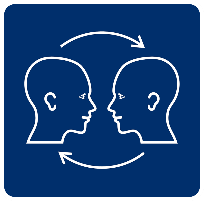An Introduction to AAC for SLT Students – by invitation only
Session
5.10
Closed Session
- Cathy Harris (Communication Matters)
- Toby Hewson (Communication Matters)
- Brett Reynolds (Scope Victoria, Australia)
Summary
This is a closed session for SLT students invited from Leeds Beckett, Sheffield and MMU Universities.
Augmentative and Alternative Communication (AAC) is a potentially life changing phenomenon. Communication Matters believes AAC should be a ‘first port of call and not a last resort’. Most people who present with a speech or language difficulty can benefit from some form of AAC. However, for many reasons, it often does not seem to get the exposure it perhaps should do within Speech and Language Therapy courses.
This session is for SLT students, to introduce you to the power of AAC and to the charity Communication Matters which aims to support people who use AAC, their families, the professionals who work with them, researchers, developers and suppliers of the systems and equipment. We will introduce Communication Matters as a charity; explain what AAC is; describe the range of AAC from ‘no-tech to high-tech’; and will share the personal experience of Brett Reynolds who uses AAC (see below). There will also be the opportunity to visit an exhibition (17.30-18.15) facilitated by leading suppliers of AAC systems and equipment.
This is a session not to be missed. Start your AAC journey here!
Brett Reynolds writes:
Living independently has always been very important to me and when my parents relocated it was the opportunity for me to pursue that goal. I came across some hurdles and obstacles but I think the main thing is to know what you want and don’t accept anything less! I had a clear plan as to what I wanted and where. I was put on many waiting lists and offered many alternative accommodation options that suited the system but not my needs. I had to be prepared to stand up for my goals which meant lots of emails, phone calls and lobbying with local Members of Parliament. Consistent communication was the key until I got the choices I wanted and needed. I also introduced myself to my community as in the local post office, newsagent and coffee shop and showed them my communication tools.
I moved into my unit, with the support of paid support workers family and friends and my community. My persistence in sticking to my goals and consistent communication paid off in providing me with the environment and home I wanted. I wouldn’t change the way I went about my plan. I think the main thing is to remember that regardless of your disability and communication difficulties you are still an individual to be heard. Never let yourself down and let others take over your goals.





